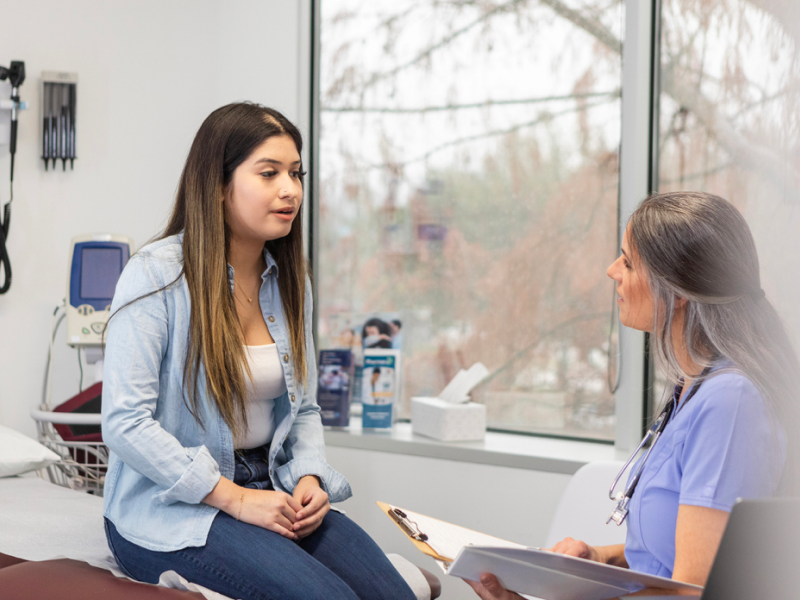
Table of Contents
What Happens When You Go to the Emergency Room for Mental Health

Written By: Alex Bachert, MPH

Clinically Reviewed By: Clary Figueroa
July 19, 2024
6 min.
If you’re experiencing a mental health crisis, the emergency department is always available. Here’s what to expect when visiting the hospital for your mental health needs.
Learn more about our Clinical Review Process
Table of Contents
Data shows that more and more people are turning to hospital emergency rooms to manage their mental health concerns. According to a report published in 2016, one in eight visits to the emergency room was linked to a mental health or substance use issue, and data shows a significant increase in mental health-related visits among children, teens, and young adults. All told, in 2021, nearly 6 million people visited the emergency room for mental health emergencies.
“The emergency room is a safety net option for many folks,” explained Maggie Vitello, LCSW, Director of Crisis Prevention & Response at Charlie Health. “It’s common for people who experience a mental health crisis on their own to think of the emergency room as a place for immediate support. It’s also common for mental health providers to send folks to the emergency room because they want to make sure that they get evaluated as soon as possible.”
While there’s debate on whether or not hospitals are the best solution for managing people’s mental health needs, it’s important to know that this resource is always available. Below, we review what to expect when you visit the emergency room for a mental health emergency and how Charlie Health can help support your ongoing mental health needs.

We specialize in supporting clients with serious mental health concerns
Our wraparound services include crisis support during and outside treatment sessions.
What happens when you go to the emergency room for mental health?
Visiting the hospital for a mental health emergency can be incredibly overwhelming, especially for teens and young adults. You’re already feeling vulnerable, and then you’re thrown into what’s often a busy and hectic environment. Below, we review what to expect when you visit the emergency room for mental health services.
1. Triage
When a person visits the hospital for a mental health concern, the first step is to meet with a triage nurse who will assess the urgency of the situation. The goal of mental health triage is to take a proactive approach to prioritizing and managing a person’s mental health needs while at the hospital.
During the assessment, the triage team will assess a person’s risk of self-harm or violence. They’ll also ask you about:
- Your current mental health symptoms
- When your symptoms started
- Mental health and medical history
- Any relevant medical diagnoses
2. Initial assessment
After triage, the care team will conduct a more thorough evaluation to understand your state of mind and treatment needs. In addition to reviewing information collected at triage, they might conduct a physical exam, order lab tests, and even speak with family members, friends, or outpatient providers about the situation.
3. Intervention
Following a complete assessment, the hospital team will be better prepared to determine the next best steps for a person’s care. This includes crisis intervention techniques, psychiatric medications, and ongoing observation and care from a mental health professional. Some people may be admitted to stay overnight or longer (depending on the severity of symptoms), while others will be cleared to go home or receive treatment in an outpatient setting.
Another option is an intensive outpatient program (IOP), such as Charlie Health’s virtual intensive outpatient program. With this program, teens and young adults work with a dedicated Crisis Services team to help them manage their mental health needs while maintaining their daily routine.
“What Charlie Health has done is create a whole crisis division. Our goal is to stabilize in the least restrictive setting,” said Vitello. “We offer an additional safety net, so if someone needs support, they can reach out over the phone, or a Care Coach can connect with them during group programming. We also provide skills-based intervention to help with coping and to stabilize crises,” they added.

4. Discharge
Once in a stable condition, you’re typically discharged from the hospital with instructions for follow-up care. Here are some things to be mindful of when leaving the hospital.
- Who is deciding to discharge you from the hospital, and on what grounds?
- What are the follow-up recommendations following discharge? Can this appointment be made while at the hospital?
- If prescribed medication, are there any possible side effects or concerns to be aware of?
- What should you do if symptoms return or get worse?
Tips for visiting the emergency room for mental health
Most trips to the emergency room are, by definition, unplanned and unexpected. However, if you or a loved one are dealing with serious mental health issues, it may be helpful to consider what you would do in the event of an emergency visit. Here’s a quick list to help you prepare in advance for mental health-related trips to the hospital.
Bring proper identification
When visiting the emergency room, remember to bring a form of identification (such as a driver’s license) and any available health insurance information.
Lean on your support system
If possible, ask a trusted family member or friend to accompany you to the hospital for emotional and practical support. If no one is available to join, bring a list of emergency contacts who can speak with your care team via the phone.
“If your provider did not send you, let them know and see if they can call ahead to speak with the social worker or a mental health professional at the hospital,” suggests Vitello. “They can share their concerns and how soon they hope you will be seen. This coordination can really help patients.”
Try to remain calm
A visit to the emergency department isn’t always a quick trip. Practicing self-care techniques, such as deep breathing and grounding exercises, can help manage stress and anxiety while waiting to be seen by the care team. One example is the 54321 method, which involves identifying 5 things you can see, 4 things you can touch, 3 things you can hear, 2 things you can smell, and 1 thing you can taste.
Create a mental health crisis plan
A mental health crisis plan is a detailed resource that helps people manage mental distress during emergency situations. Designed to provide reassurance and guidance during challenging times, the resource typically includes emergency contact information, relevant medical conditions, and a list of current medications. It can also help guide the hospital staff on how to best support your needs.
Be honest and open
From the triage nurses to the on-call psychiatrist, the hospital care team is focused on providing access to effective and efficient care. By being honest about your symptoms and health history, you’re helping them to better care for your needs. Similarly, remember that it’s okay to honestly express your preferences and communicate concerns about your treatment.
What if I can’t get to the emergency room?
If you don’t have access to a local emergency room or prefer to avoid hospitalization for your mental health concerns, you can reach out to a mental health hotline instead.
The Suicide & Crisis Lifeline is a national network of local crisis centers that offer free and confidential support to people experiencing mental health concerns. Whether you’re contemplating suicide, struggling with mental illness, or simply need someone to talk to, crisis counselors are available for 24/7 support. To get in touch, call or text 988.
Here are some other mental health emergency services hotlines:
- Substance Abuse and Mental Health Services Administration National Helpline: To get in touch, call 1-800-662-4357
- National Domestic Violence Hotline: To get in touch, call 1-800-799-7233
Keep in mind that in certain emergency or life-threatening situations, a crisis hotline will likely encourage you to seek care at the emergency department.

Get support at Charlie Health
If you or a loved one require mental health treatment, it’s important to know how to connect with the right level of care for your needs. Treatment looks different for everyone, so learning about your options—including emergency care—can help you prepare for whatever comes your way.
Charlie Health’s virtual Intensive Outpatient Program (IOP) provides more than once-weekly mental health treatment for young people and families dealing with serious mental health conditions, including clients in crisis. Our expert clinicians incorporate evidence-based therapies into individual counseling, family therapy, and group sessions. With this kind of holistic treatment, managing serious mental health issues is possible. Complete the form below to begin healing today.
References




